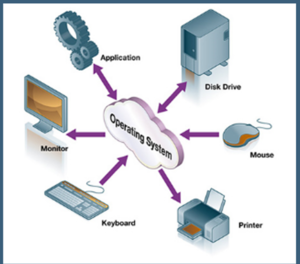Difference between revisions of "Operating System (OS)"
(An operating system (OS) is system software that manages computer hardware and software resources and provides common services for computer programs.) |
m |
||
| (4 intermediate revisions by the same user not shown) | |||
| Line 1: | Line 1: | ||
| − | An operating system (OS) is system software that manages computer hardware and software resources and provides common services for computer programs. All computer programs, excluding firmware, require an operating system to function. Time-sharing operating systems schedule tasks for efficient use of the system and may also include accounting software for cost allocation of processor time, mass storage, printing, and other resources.<ref> | + | An '''operating system (OS)''' is system software that manages computer hardware and software resources and provides common services for computer programs. All computer programs, excluding firmware, require an operating system to function. Time-sharing operating systems schedule tasks for efficient use of the system and may also include accounting software for cost allocation of processor time, mass storage, printing, and other resources.<ref>[https://en.wikipedia.org/wiki/Operating_system Operating System Definition]</ref> |
[[File:Operating system.png|300px|Operating System]]<br /> | [[File:Operating system.png|300px|Operating System]]<br /> | ||
| − | source: | + | source: Google |
| Line 15: | Line 15: | ||
*Providing a user interface | *Providing a user interface | ||
*Managing the computer's memory | *Managing the computer's memory | ||
| − | *Managing the hardware<ref> | + | *Managing the hardware<ref>[http://www.teach-ict.com/as_a2_ict_new/ocr/A2_G063/332_designing_systems/operating_systems/miniweb/index.htm What is an Operating System?]</ref> |
| − | + | == Classification of Operating systems == | |
*Multi-user: Allows two or more users to run programs at the same time. Some operating systems permit hundreds or even thousands of concurrent users. | *Multi-user: Allows two or more users to run programs at the same time. Some operating systems permit hundreds or even thousands of concurrent users. | ||
*Multiprocessing : Supports running a program on more than one CPU. | *Multiprocessing : Supports running a program on more than one CPU. | ||
| Line 26: | Line 26: | ||
| − | + | == See Also == | |
| − | [[ | + | *[[Desktop Operating System]] |
| − | [[ | + | *[[Mobile Operating System]] |
| − | [[ | + | *[[Server Operating System]] |
| + | *[[Disk Operating System (DOS)]] | ||
| + | *[[Network Operating System (NOS)]] | ||
| − | + | == References == | |
<references /> | <references /> | ||
| − | + | == Further Reading == | |
| − | * | + | *[http://www.gcflearnfree.org/computerbasics/understanding-operating-systems/1/ Computer Basics: Understanding Operating Systems] |
| − | * | + | *[https://www.lifewire.com/operating-systems-2625912 Operating System Definition & Examples] |
| − | * | + | *[https://www.tutorialspoint.com/operating_system/os_overview.htm Operating System - Overview] |
| − | * | + | *[http://computer.howstuffworks.com/operating-system.htm How Operating Systems Work] |
| − | * | + | *[http://whatis.techtarget.com/definition/operating-system-OS What is Operating System] |
| + | __NOTOC__ | ||
Latest revision as of 14:22, 17 July 2023
An operating system (OS) is system software that manages computer hardware and software resources and provides common services for computer programs. All computer programs, excluding firmware, require an operating system to function. Time-sharing operating systems schedule tasks for efficient use of the system and may also include accounting software for cost allocation of processor time, mass storage, printing, and other resources.[1]
Without an operating system, a computer is just a collection of components heating up the room as no-one would be able to make any practical use of the machine. A large number of operating systems have been developed over the years; each designed with a certain kind of computer in mind. For instance:
- Windows or Linux - for personal computers
- MacOS, iOS- for Macs and iPhone and iPad
- Unix - for mainframes
- Symbian, Android - for mobile phones
Although these operating systems have been developed to work with very different types of computers, they all share a number of common functions:
- Providing a user interface
- Managing the computer's memory
- Managing the hardware[2]
Classification of Operating systems
- Multi-user: Allows two or more users to run programs at the same time. Some operating systems permit hundreds or even thousands of concurrent users.
- Multiprocessing : Supports running a program on more than one CPU.
- Multitasking : Allows more than one program to run concurrently.
- Multithreading : Allows different parts of a single program to run concurrently.
- Real time: Responds to input instantly. General-purpose operating systems, such as DOS and UNIX, are not real-time.
See Also
- Desktop Operating System
- Mobile Operating System
- Server Operating System
- Disk Operating System (DOS)
- Network Operating System (NOS)
References

